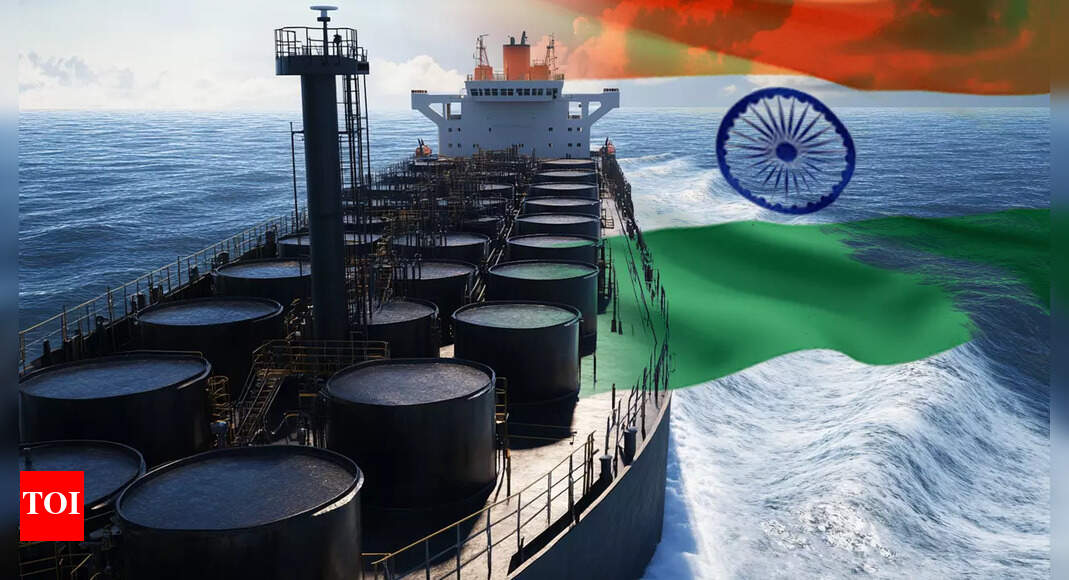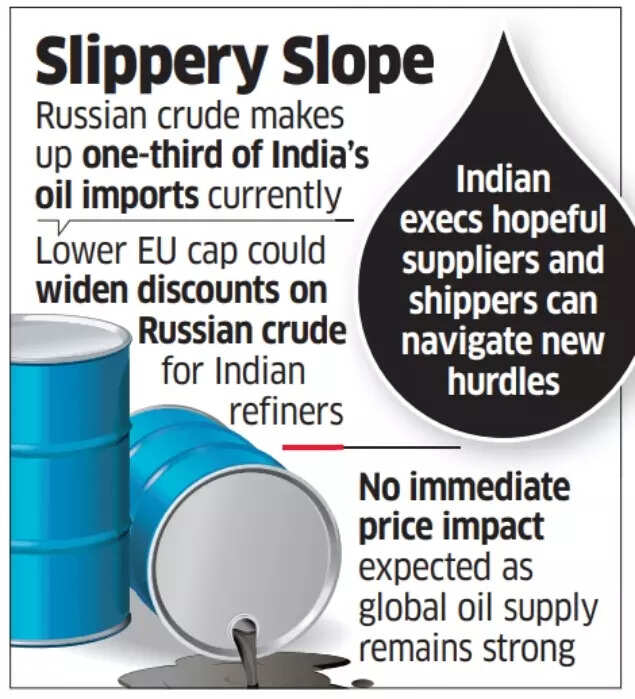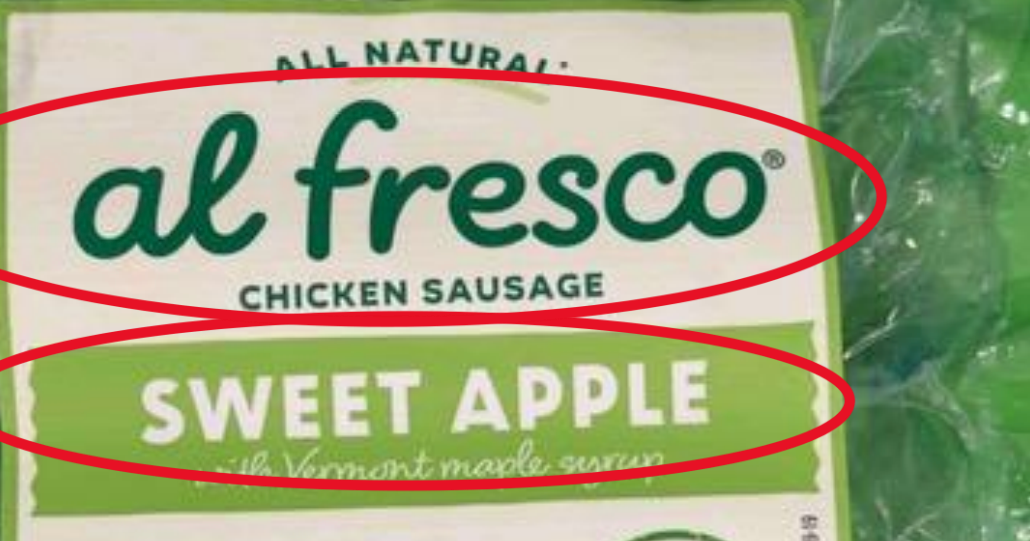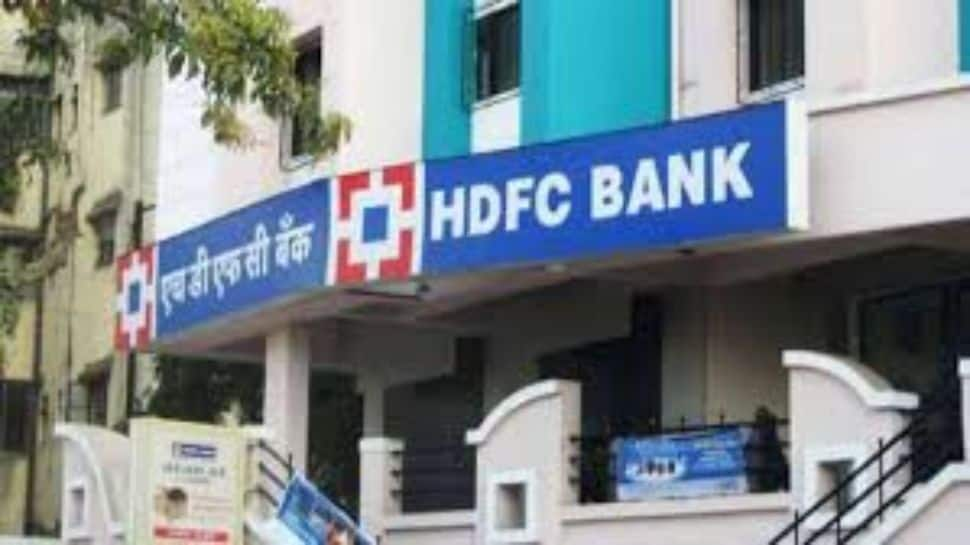Russia oil sanctions: EU moves on crude, oil price cap may hit Reliance, Nayara; enforcing may be difficult, India may still benefit – Times of India

Russia oil sanctions impact: Both Nayara Energy and Reliance Industries Limited (RIL) are likely to face challenges from the fresh sanctions imposed by the European Union on Russia oil.The EU introduced its 18th sanctions package on Friday, reducing the Russian oil price ceiling to $47.6 per barrel from the current $60, whilst also implementing measures against vessels involved in its transportation. The revised price cap takes effect September 3.While EU’s sanctions targeting Nayara Energy present significant operational difficulties for the company, the restrictions on Russian oil-derived fuels create a challenge for RIL, according to an ET report.Also Read | Russia oil squeeze: Trump’s 100% tariff threat – should India panic?Both Nayara and RIL now confront possible exclusion from EU markets, according to industry experts and analysts. These developments additionally hinder Rosneft‘s reported intentions to sell its 49% ownership in Nayara. Both RIL and Nayara are India’s leading fuel exporters.
EU sanctions on Russia: Challenges for RIL
RIL, which maintains a long-term agreement to purchase considerable amounts of crude from Rosneft, currently faces a critical decision: abandon access to discounted Russian oil supplies or lose entry to Europe’s profitable diesel market. Either choice would likely affect the company’s refining profit margins.Reliance, which has historically found Europe to be its most lucrative market for refined fuel exports, may face challenges. Industry specialists suggest that enforcing import restrictions could prove challenging for the EU, as Indian refiners typically work through trading intermediaries rather than dealing directly with European customers.
EU sanctions on Russia: How Nayara Will Be Hit
The European Union has imposed comprehensive sanctions against Nayara Energy, including organisations managing shadow fleet vessels and those involved in Russian oil trade.An industry expert told the financial daily that Nayara could face difficulties with banking transactions, particularly with European-linked banks. The expert also highlighted potential challenges in accessing crucial European technical support for refinery operations, whilst acknowledging possible alternative solutions.

Slippery Slope
The sanctions prevent Nayara from selling refined products to Europe.
Sanctions: Can They Be Implemented?
- The European Union faces difficulties in implementing the price cap without US support. Oil transactions being denominated in dollars and processed through American financial systems give the United States significant control over enforcing violations of any caps.
- Although the United States has not endorsed the European Union’s initiative, it is independently increasing pressure by proposing a 100% secondary tariff on Russia until it negotiates peace with Ukraine.
- Industry sources indicated that the EU’s decision was perceived as inconsistent, noting that European nations dependent on Rosneft would likely have secured alternative supply arrangements before implementing this measure.
Indian Government’s Stance
An industry representative indicated these matters require governmental intervention. The Indian government has opposed the sanctions, emphasising the priority of energy security.Also Read | India to tie-up with France for next-generation fighter jet engine? Defence Ministry pitches Rs 61,000 crore project; key step towards self-reliance“India maintains its position against unilateral sanctions,” stated Ministry of External Affairs (MEA) spokesperson Randhir Jaiswal on Friday. “As a responsible nation, we remain devoted to our legal commitments. The Government of India prioritises energy security as crucial for meeting our citizens’ essential requirements. We emphasise the need for consistent standards regarding energy commerce.”Officials said that the European Union’s decision appeared inconsistent, noting that European nations dependent on Rosneft should have secured alternative supplies before implementing such measures.The MEA had previously addressed “double standards” on Thursday, responding to the North Atlantic Treaty Organisation (NATO) secretary general’s suggestions of potential secondary sanctions on India for continuing trade relations with Russia.
Advantage India As Well
The EU implemented on Friday “an automatic and dynamic mechanism to modify the oil price cap” to maintain prices consistently below market rates, unlike the previous two years when the $60 cap occasionally exceeded market values. “For India, this should enhance the appeal of Russian oil, particularly as recent discounts had diminished,” noted MK Surana, former chairman of Hindustan Petroleum.Also Read | Russia crude oil restrictions: EU imposes sanctions on Rosneft’s India refinery, lowers oil price cap – how it may benefit IndiaThis development particularly advantages state-operated companies like Indian Oil, HPCL and BPCL, which have minimal European exports whilst being significant purchasers of Russian oil, according to the ET report.“Most Russian purchases by Indian refiners are on a delivered basis so suppliers and traders will have to figure out the way to navigate through sanctions on vessels,” Surana was quoted as saying.
var _mfq = window._mfq || [];
_mfq.push([“setVariable”, “toi_titan”, window.location.href]);
!(function(f, b, e, v, n, t, s) {
function loadFBEvents(isFBCampaignActive) {
if (!isFBCampaignActive) {
return;
}
(function(f, b, e, v, n, t, s) {
if (f.fbq) return;
n = f.fbq = function() {
n.callMethod ? n.callMethod(…arguments) : n.queue.push(arguments);
};
if (!f._fbq) f._fbq = n;
n.push = n;
n.loaded = !0;
n.version = ‘2.0’;
n.queue = [];
t = b.createElement(e);
t.async = !0;
t.defer = !0;
t.src = v;
s = b.getElementsByTagName(e)[0];
s.parentNode.insertBefore(t, s);
})(f, b, e, ‘https://connect.facebook.net/en_US/fbevents.js’, n, t, s);
fbq(‘init’, ‘593671331875494’);
fbq(‘track’, ‘PageView’);
};
function loadGtagEvents(isGoogleCampaignActive) {
if (!isGoogleCampaignActive) {
return;
}
var id = document.getElementById(‘toi-plus-google-campaign’);
if (id) {
return;
}
(function(f, b, e, v, n, t, s) {
t = b.createElement(e);
t.async = !0;
t.defer = !0;
t.src = v;
t.id = ‘toi-plus-google-campaign’;
s = b.getElementsByTagName(e)[0];
s.parentNode.insertBefore(t, s);
})(f, b, e, ‘https://www.googletagmanager.com/gtag/js?id=AW-877820074’, n, t, s);
};
function loadSurvicateJs(allowedSurvicateSections = []){
const section = window.location.pathname.split(‘/’)[1]
const isHomePageAllowed = window.location.pathname === ‘/’ && allowedSurvicateSections.includes(‘homepage’)
const ifAllowedOnAllPages = allowedSurvicateSections && allowedSurvicateSections.includes(‘all’);
if(allowedSurvicateSections.includes(section) || isHomePageAllowed || ifAllowedOnAllPages){
(function(w) {
function setAttributes() {
var prime_user_status = window.isPrime ? ‘paid’ : ‘free’ ;
var geoLocation = window?.geoinfo?.CountryCode ? window?.geoinfo?.CountryCode : ‘IN’ ;
w._sva.setVisitorTraits({
toi_user_subscription_status : prime_user_status,
toi_user_geolocation : geoLocation
});
}
if (w._sva && w._sva.setVisitorTraits) {
setAttributes();
} else {
w.addEventListener(“SurvicateReady”, setAttributes);
}
var s = document.createElement(‘script’);
s.src=”https://survey.survicate.com/workspaces/0be6ae9845d14a7c8ff08a7a00bd9b21/web_surveys.js”;
s.async = true;
var e = document.getElementsByTagName(‘script’)[0];
e.parentNode.insertBefore(s, e);
})(window);
}
}
window.TimesApps = window.TimesApps || {};
var TimesApps = window.TimesApps;
TimesApps.toiPlusEvents = function(config) {
var isConfigAvailable = “toiplus_site_settings” in f && “isFBCampaignActive” in f.toiplus_site_settings && “isGoogleCampaignActive” in f.toiplus_site_settings;
var isPrimeUser = window.isPrime;
var isPrimeUserLayout = window.isPrimeUserLayout;
if (isConfigAvailable && !isPrimeUser) {
loadGtagEvents(f.toiplus_site_settings.isGoogleCampaignActive);
loadFBEvents(f.toiplus_site_settings.isFBCampaignActive);
loadSurvicateJs(f.toiplus_site_settings.allowedSurvicateSections);
} else {
var JarvisUrl=”https://jarvis.indiatimes.com/v1/feeds/toi_plus/site_settings/643526e21443833f0c454615?db_env=published”;
window.getFromClient(JarvisUrl, function(config){
if (config) {
const allowedSectionSuricate = (isPrimeUserLayout) ? config?.allowedSurvicatePrimeSections : config?.allowedSurvicateSections
loadGtagEvents(config?.isGoogleCampaignActive);
loadFBEvents(config?.isFBCampaignActive);
loadSurvicateJs(allowedSectionSuricate);
}
})
}
};
})(
window,
document,
‘script’,
);
[title_words_as_hashtags




